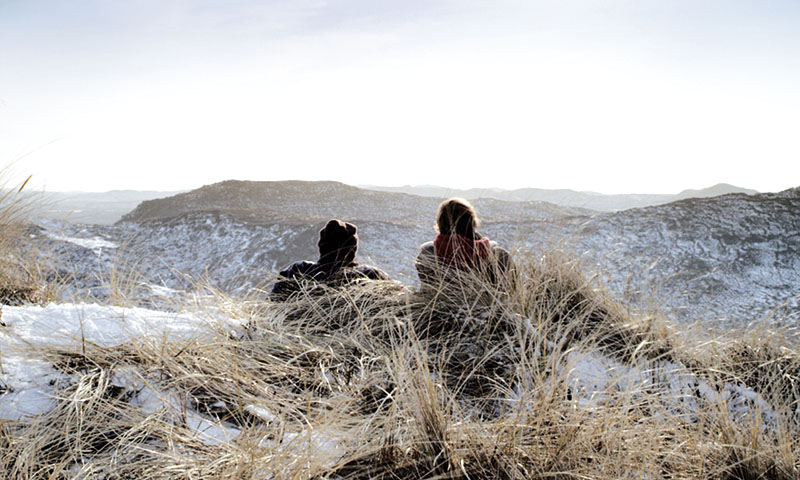« Udo Jürgens – The Man with the Bassoon | Home | Hail the American Mustang! »
Berlinale 2012 – Perspektive Deutsches Kino
By Dorothea Holloway | February 8, 2012

In photo: Westerland by Tim Staffel in Perspektive Deutsches Kino, courtesy Fabian Spuck/Salzgeber Medien
With curiosity and while scratching my head a bit I watched the long documentary – 96 minutes – Man for a Day by Katarina Peters. The story revolves around a social lab experiment, a workshop by performance artist Diane Torr with a dozen women from Berlin. The question: »What makes a man a man – what makes a woman a woman?« for those who want to know this is a must see. Man for a Day is the opening film for the Perspektive Deutsches Kino – curated by Linda Söffker.
And another definite is This ain’t California by Marten Persiel – 90 minutes. It is a Super 8 production about skateboarders, the youth of East-Germany in the 80s (mostly young men) that have build their own DIY boards. What a document! And the accompanying press release is translated and available in seven languages. Production by Wildfremd GmbH.
I am already realizing, I could probably recommend every film of the Perspektive: For example, Sterben nicht vorgesehen (Dying not planned for) by Matthias Stoll. Or, Rodicas by Alice Gruia (53 minutes) who accompanies two life-loving and humorous ladies, her grand-mother Rodica Gruia – 88 years old – and her friend Rodica Grill – 86 years.
›Perspective‹ derives from the Latin: To penetrate with looks and recognize clearly. So it is with Perspektive Deutsches Kino 2012. Each contribution to this program gives an insight into worlds that we are not so familiar with and illuminates problems. A mostly reflective and critically serious section of the Berlinale. One example: Tage in der Stadt (Days in the City) by Janis Mazuch. We are familiarized with the fate of a woman who has spent years in prison and now seeks to find her place in the world. I love Westerland on the island of Sylt in summer. The winter I have never experienced. Filmmaker Tim Staffel’s Westerland unravels a peculiar love story – the beginning and the end – on this winter island. Very important: Karaman by Tamer Yiit and Branka Prlic. These youth from Turkey is longing for the future. They want to find their own way, test new horizons, experience the world, Europe or at least Berlin. Zehra studies in Istanbul and visits a family in Karaman in Central Anatolia and asks her father to have permission to continue her studies in Berlin.
In Gegen Morgen, directed by Joachim Schoenfeld, two police officers are literally ›chained‹ together since they both are assigned to observe a released murderer. This Personenschutz turns out to be boring and absurd, full of suspense, but also bitter…
Sometimes we sit and think and sometimes we just sit by Julian Poerksen, script and direction. A man of approximately just 50 years (remarkably convincing: Peter Rene Lüdicke) moves into a retirement home and does do simply nothing there. He is cared for – he eats and drinks – and does do nothing. He sits in the recliner, legs up on a stool. The surrounding world is upset. To do nothing, just to sit around – life goes on. How often have I heard this phrase. Just a clichée! The film provokes reflection and concern. Do we always have to fulfill society’s expectations? He just wants to sit around.
Ararat by Engin Kundag: Deutschländer Nuh travels to eastern Turkey to attend the funeral of his father. It comes to painful frictions in his brother’s home. At Ararat, an extinct volcano, is Noah’s Ark to be stranded. From the final scene of this feature short (26 min.), I’m intrigued. The image of Mount Ararat, I will never forget.(Camera: Borris Kehl). Also in Soleen Yusef’s Trattoria, there are tragic family problems, this time between father and daughter.
And again the topic is a daughter in The Missing. The 14-year old Martha has disappeared. I associate Jean-Paul Sartre: »The youth longs for the future.« The father learns in his search for his daughter, that it is not unusual for young persons to just disappear. Why? You just do not want to have your feet under the family table any longer? Self-discovery? As a teenager I wrote into the diary of my girlfriend: »Who can be silent and wait, the roses will bloom in the garden.« I am sure that the problems of coming of age will be also a topic in Generation and Forum.
The 90 minutes of Dichter und Kämpfer (Poet and fighter) by Marion Hütter were both entertaining and instructive. Marion Hütter chronicles four Poetry Slammers over the period of a year in conversation, rehearsals and performances. Thank you for the Insight into the Poetry Slam scene!
Now one more important advice: In the Perspektive Deutsches Kino will be a film, which has received the Main Prize at the Max-Ophüls-Festival in Saarbrücken. It is Michael by Markus Schleinzer (see KINO 101’s Cannes Report) Don’t miss this film, but also do not miss the Panorama’s King of the Comics by Rosa von Praunheim. You will have a ball. Most likely the funniest film of the festival. In any case –do not miss the GERMAN FILMS!
Topics: Film Reviews, German Film, KINO #102 Berlinale 2012 Issue | Comments Off on Berlinale 2012 – Perspektive Deutsches Kino
Comments are closed.
